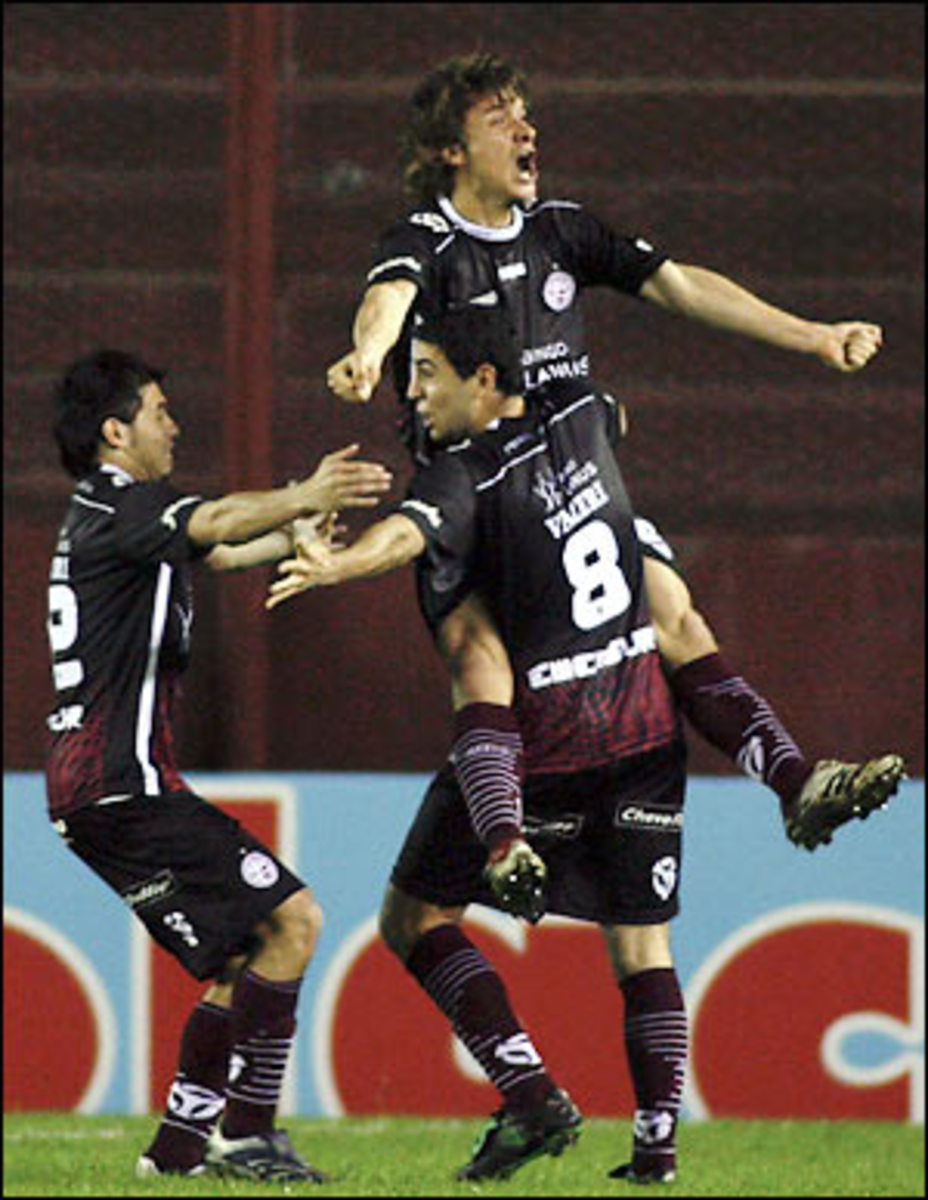Bottoms up in Argentina
Finally, some positive news from Argentina. It seems like all we hear from the most competitive league in Latin America is reports of violence and corruption.
Thankfully, it's been mostly about the soccer during the 2007 Apertura championship, one of the most wide-open affairs in years. Some of the smallest clubs in the first division have realistic chances of winning the title and breaking through the traditional five-team monopoly.
With just five rounds to play, the table is topped by surprising Lanús, a club that has yet to win a championship or major title in 92 years of existence. On its heels are Independiente and newly promoted Tigre, tied for second. Boca Juniors have a tenuous grip on third place, but all four teams are only separated by three points. Meanwhile, a number of other teams still have an outside chance.
Lanús is only two points ahead of Independiente, and the club from southern Buenos Aires knows it has a commanding position and the necessary firepower to win its first-ever league championship. El Granate has a proven goal scorer in former River Plate striker José Sand, whose 10 goals have helped Lanús stay undefeated in its last five matches. But Lanús' hopes could come to a crashing halt with a difficult late-season schedule that involves showdowns with three top-five teams: Tigre, Argentinos Juniors and Boca Juniors.
Perhaps even more surprising than Lanús' rise is Tigre, which returned to the top flight this season after an absence of 27 years. The suburban Buenos Aires club has demonstrated that a never-say-die attitude goes a long way in the Argentine first division -- witness its emphatic 4-1 victory over River Plate earlier this season. But Tigre's title run in is rather daunting, particularly because it faces Boca Juniors in the final weekend of the season.
That match could decide the title, as Boca will surely be there fighting right until the end even though it's having a rather disappointing season, by its own high standards. An unexpected 1-1 draw against Estudiantes de La Plata at the Bombonera last weekend seriously dented Boca's chances of winning its third championship in five seasons.
Despite this, Miguel Ángel Russo's side still knows that the championship is completely in its hands. There are some difficult tests ahead for Boca -- including visits to Racing Club and Tigre -- but the Xeneizes can still be considered Argentina's most dangerous team.
Boca has demonstrated it can still play effective soccer, even though the departure of Juan Román Riquelme has had a huge effect on its campaign. Look no further than the team's 2-0 loss in the much-anticipated superclásico earlier this month -- Boca lacked any type of creativity in the midfield against archrival River Plate, and that's been a big reason why it has struggled this season.
In stark contrast, River started off the season on the wrong foot, but has picked up in recent weeks. Now the team has an outside chance of fighting for the title. Daniel Passarella's free-scoring side may be five points behind the league leaders, but still has a good shot. If River overcomes Independiente at the Monumental on Sunday, it will be in a good position for its last four matches against beatable opponents.
Still, from the clubs in contention, the eventual champion will most likely be Pedro Troglio's Independiente. Los Diablos Rojos have been the league's most exciting team this season and have proven that it has what it takes to win its first national championship since '02.
That particular team featured an enormous amount of talent, such as Gabriel Milito, MarianoPernía, Federico Insúa and Daniel Montenegro. The quality on hand seemed to indicate that the club's future was bright -- but a massive-scale exodus abroad of key players soon followed.
Independiente couldn't recover, and it wasn't able to field a contending team for the next few years. After an embarrassing 11th-place finish in last season's Clausura Championship, the club changed its ways and, rather than offloading its most talented players for large sums of money, kept them for another season.
This approach is the main reason for the team's sudden revival, and is in large part thanks to the form of star striker Germán Denis, who stayed despite receiving several lucrative offers to join some of Europe's biggest clubs. A recent national-team call-up, Denis has become the league's top scorer this season, with a whopping 16 goals in 14 league matches.
But even though Denis got on the score sheet against San Lorenzo in Avellaneda last Sunday, it wasn't enough. His side lost 2-1 to the reigning champions and missed a great opportunity to seize first place.
Even so, it's a surprising race to the finish and could signal a shift in the balance of power in Argentina. The game is traditionally dominated by the Big Five (Boca, River, San Lorenzo, Independiente and Racing), but this season, less illustrious clubs are making a stand. The fact that the likes of Lanús and Tigre are among the top three at such a decisive stage of the championship is a true reflection of how even the level of competition has recently become.






